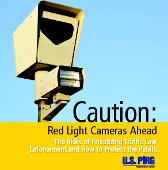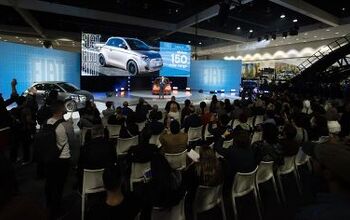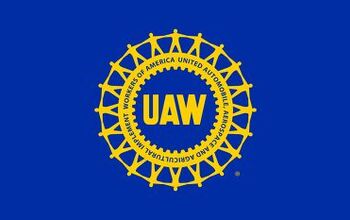Study Questions Wisdom of Privatized Law Enforcement
An estimated sixty million Americans live in a jurisdiction monitored by an automated ticketing machine. According to a report released today by the left-leaning US Public Interest Research Group (US PIRG), the trend of privatizing law enforcement raises a number of issues that put the public in those areas at risk.
“Pitfalls can arise when contracts encourage vendors to treat automated traffic enforcement systems as a profit center: by maximizing the number of tickets written, regardless of the impact on public safety; by limiting the ability of governments to set traffic safety policies according to community needs; or by constraining the ability of cities to terminate contracts early in the event that automated enforcement systems are rejected by the electorate or fail to meet safety goals,” the study explained.
Under severe budgetary pressures, local jurisdictions often sign contracts with vendors that were presented with a slick marketing campaign. Such deals often contain extremely unfavorable terms. The public is hurt by per-ticket payment systems — often disguised with “cost neutral” contract language — that ensure that the system is designed to maximize revenue, not safety. Such provisions provide a monetary incentive to increase the number of tickets issued. That leads to other provisions prohibiting cities from lengthening yellow light duration to improve safety and requiring right on red ticketing and ticket approval quotas.
“Many automated traffic law enforcement contracts create risk by penalizing municipalities or leaving them exposed to costly and disruptive lawsuits in the case of early termination of the contract, leaving taxpayers on the hook even if the camera system fails to meet community objectives,” the study noted. “Contract terms that keep municipalities locked in with heavy cancellation fees or threaten them with expensive litigation if they change their minds are not in the best interests of the public.”
The report’s authors suggested the privatized law enforcement arrangement creates a dynamic where the companies end up lobbying for the creation of more violations. In Florida, for example, red light camera companies employed forty lobbyists at a cost of over $2 million to kill legislation that would have mandated longer yellow signal times and that would have otherwise limited the use of photo ticketing. Both Redflex Traffic Systems of Australia and American Traffic Solutions (ATS) have created front groups to create the appearance that these corporate efforts have “grassroots” support.
The study concluded with recommendations about the way to structure a red light camera program “free from potential conflicts of interest.” No such principles are adhered to by any existing photo ticketing program.
A copy of the study is available in a 1mb PDF file at the source link below.
Source:
Caution: Red Light Cameras Ahead (US Public Interest Research Group, 10/27/2011)
Courtesy: Thenewspaper.com
More by The Newspaper
Latest Car Reviews
Read moreLatest Product Reviews
Read moreRecent Comments
- JMII Hyundai Santa Cruz, which doesn't do "truck" things as well as the Maverick does.How so? I see this repeated often with no reference to exactly what it does better.As a Santa Cruz owner the only things the Mav does better is price on lower trims and fuel economy with the hybrid. The Mav's bed is a bit bigger but only when the SC has the roll-top bed cover, without this they are the same size. The Mav has an off road package and a towing package the SC lacks but these are just some parts differences. And even with the tow package the Hyundai is rated to tow 1,000lbs more then the Ford. The SC now has XRT trim that beefs up the looks if your into the off-roader vibe. As both vehicles are soft-roaders neither are rock crawling just because of some extra bits Ford tacked on.I'm still loving my SC (at 9k in mileage). I don't see any advantages to the Ford when you are looking at the medium to top end trims of both vehicles. If you want to save money and gas then the Ford becomes the right choice. You will get a cheaper interior but many are fine with this, especially if don't like the all touch controls on the SC. However this has been changed in the '25 models in which buttons and knobs have returned.
- Analoggrotto I'd feel proper silly staring at an LCD pretending to be real gauges.
- Gray gm should hang their wimpy logo on a strip mall next to Saul Goodman's office.
- 1995 SC No
- Analoggrotto I hope the walls of Mary Barra's office are covered in crushed velvet.


































Comments
Join the conversation
Privatizing our prisons has created a $4B industry and many, many laws designed to keep people in these private prisons. Each empty bed costs the company money. The prison lobby is strong and getting stronger. Pretty soon, they will put folks in jail for any trumped up charge and never let you out. The prison owners get bonuses bases upon occupancy - this is not American it is more like Mussolini, a fascist.
One other stakeholder has not been mentioned in this article: insurance companies. When premium increases are tied to traffic tickets, they stand to make a lot of money from these cameras and from private law enforcement. Didn't GEICO sponsor these cameras at one time?